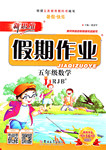题目内容
There ________ one boy and two girls in the classroom.
- A.being
- B.is
- C.have been
- D.are

 新思维假期作业寒假吉林大学出版社系列答案
新思维假期作业寒假吉林大学出版社系列答案“Grandma, Grandma, tell us a story ! ”Four darling children sat by my feet, looking up at me expectantly. Suddenly, we were interrupted clapping.“Terrific, ” the director said, stepping up the stage from the aisle(过道).“Except, could you kids face the audience a bit more? ”
The kids shifted to face the empty seats, which would be filled in a few days for the church play.“Perfect,” the director said. “Now, Grandma, read to your grandchildren.” A pang of sadness hit me. If' only I could read to my real grandchild!
I had a granddaughter, but I'd never met her. Sixteen years earlier my son was involved in a relationship that ended badly. But out of' it came a blessing: a baby girl named Lena. I hoped to be a grandmother to her-but shortly after the birth, the mother moved without any address left. Over the years, I asked around town to try and find my son’s ex-wife (前妻),but it seemed that she didn’t want to be found.
I'd just joined this new church a week earlier and was at once offered the part of Grandma in the play. At least now I could pretend to be a grandma. The rehearsals went well, and finally the day of' the show arrived. The performance was great. “You all looked so natural up there, ”one of' my friends said.
Afterward, we went to the church basement for refreshments (茶点).I walked over to one of the girls in the play. Rehearsals had been such a whirlwind (一片忙乱) that we never really got to talk. “How's my granddaughter? ” I joked.
“Fine !” she answered. Just then, someone else walked up and asked the girl her name.
I wasn't sure I heard the girl's answer correctly. But it made me ask her another question.“What's your mother's name? ”
She told me, I was still in shock.“And what's your father's name? ”I asked. She told me.It was my son.
She'd only started going to that church a week before I did. Since that day of 'the play, we've stayed close. Not long ago, she even made me a great grandma.
【小题1】What was the author doing at the beginning of' the story?
| A.Telling a story. | B.Playing a game. |
| C.Preparing for a play. | D.Acting in a movie. |
| A.The director's words reminded her of 'her lost granddaughter. |
| B.The director's words hurt her so badly. |
| C.She wished that she had a real grandchild. |
| D.The director wasn’t content with her performance. |
| A.The author played a joke on Lena. |
| B.Lena treated the author as a friend. |
| C.The author got to know who Lena was. |
| D.Lena mistook the author for her grandmother. |
| A.time and events |
| B.contrast and conclusion |
| C.cause and effect |
| D.questions and answers |
| A.light-hearted | B.Heartbroken | C.confused | D.anxious |
A Frenchman went to a small Italian town and was staying with his wife at the best hotel there. One night, he went out for a walk alone. It was late and the small street was dark and quiet. Suddenly he felt someone behind him. He turned his head and saw an Italian young man who quickly walked past him. The man was nearly out of sight when the Frenchman suddenly found that his watch was gone. He thought that it must be the Italian who had taken his watch. He decided to follow him and get back the watch.
Soon the Frenchman caught up with the Italian. Neither of them understood the other’s language. The Frenchman frightened the Italian with his fist (拳头) and pointed at the Italian’s watch. In the end the Italian gave up his watch to the Frenchman.
When he returned to the hotel, the Frenchman told his wife what had happened. He was greatly surprised when his wife pointed to the watch on the table. Now he realized that by mistake he had robbed the watch and it was the Italian’s.
1.The Frenchman went to a small Italian town _______.
|
A.with his wife |
B.alone |
|
C.with his friend |
D.with an Italian |
2.One night he went out for _______ alone.
|
A.a ride |
B.a walk |
C.a drink |
D.rest |
3.Suddenly he found his_______ was gone.
|
A.watch |
B.money |
C.book |
D.ring |
4. The Italian gave up his watch to him at last because ________.
|
A.he had stolen the watch from the Frenchman. |
|
B.he understood what the Frenchman wanted |
|
C.he had picked up the watch on his w ay from work |
|
D.he was afraid of the Frenchman |
5.Who was robbed of the watch on earth?
|
A.The Frenchman was. |
B.The Italian was. |
|
C.Both of them was. |
D.Neither of them was. |